Chanar Gul: from subsistence to success
Give a man a fish and he’ll eat for a day. Give him business training and access to credit and he’ll establish a profitable calf-rearing business with eight partners, more than tripling his income, then use the waste to help offset his fuel expenses. At least, that’s what Chanar Gul did.
“Before (joining Hand in Hand) I was only earning enough to feed my family. Now I can pay for school expenses and even save some money every month,” says the married father of two from Sholgara district, north Afghanistan, not far from the Uzbek border.
Mixed tidings
Chanar’s district is highly populated and ethnically mixed, with substantial Pashtun, Tajik, Uzbek and other communities.
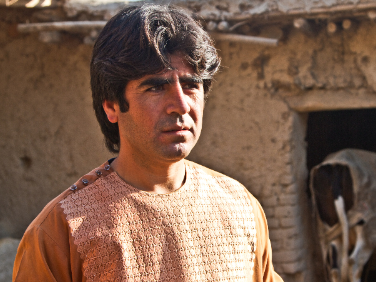 A newly paved road from Mazar-i-Sharif, the region’s biggest city, connects with a vibrant marketplace in the district centre – a boon to commercial farmers such as Chanar. Still, there are reasons to be concerned. Explosives discovered along the road in recent months have prompted major questions about the area’s security, and earthquakes in the region are common. Floods are too. In spring 2013, heavy rainfall forced thousands of families from their homes, killing dozens and destroying thousands more livelihoods.
A newly paved road from Mazar-i-Sharif, the region’s biggest city, connects with a vibrant marketplace in the district centre – a boon to commercial farmers such as Chanar. Still, there are reasons to be concerned. Explosives discovered along the road in recent months have prompted major questions about the area’s security, and earthquakes in the region are common. Floods are too. In spring 2013, heavy rainfall forced thousands of families from their homes, killing dozens and destroying thousands more livelihoods.
“I am more hopeful for my family’s future”
Sholgara District, Afghanistan
Bullish growth
Cows are big business in Sholgara district, where families treat livestock the way Westerners treat savings accounts: as a source of security. Given his experience working on a neighbour’s farm, Chanar was sure his own business could be commercially viable. But lacking the right skill set to strike out on his own, he was stuck earning a subsistence wage of 2,000 Afghanis (US $36) a month – far from enough to cover his growing family’s expenses. Anxious to improve his situation, the 27-year-old joined a Hand in Hand Self-Help Group to receive business training and learn about peer-to-peer lending.
 Just a few months later, after establishing a strong sense of mutual trust, Chanar and eight group members went into business. Armed with a small loan and help from a vocational mentor with livestock management, animal health and more – both supplied by Hand in Hand Afghanistan – the group achieved total self-sufficiency in only two months. They’re also well on their way to paying off their loan, thanks in no small part to the money they’ve saved using cow dung as a cheap, energy efficient and sustainable source of fuel.
Just a few months later, after establishing a strong sense of mutual trust, Chanar and eight group members went into business. Armed with a small loan and help from a vocational mentor with livestock management, animal health and more – both supplied by Hand in Hand Afghanistan – the group achieved total self-sufficiency in only two months. They’re also well on their way to paying off their loan, thanks in no small part to the money they’ve saved using cow dung as a cheap, energy efficient and sustainable source of fuel.
“Now I earn 6,000 AFN (US $108) a month and I’m more hopeful for my family’s future,” says Chanar.
Chanar’s results
Monthly income of 6,000 AFN (US $108)
300% increase over previous income
More hope for his children’s future
Meet Palwasha, the trainer who returned home
Hand in Hand Afghanistan entrepreneurs aren’t the only ones making a difference. Across the country, in a growing number of provinces, trainers are too.
Take Palwasha Rafiqzada (pictured above, left). In less than a year, the vocational trainer has instructed 154 women in five different villages on skills as varied as poultry rearing and knitting. It’s a small contribution to the thousands of jobs created by Hand in Hand Afghanistan, but one that Palwasha finds hugely fulfilling all the same. “I’m proud to work with poor people toward a change,” says the 41-year-old.
An uphill battle
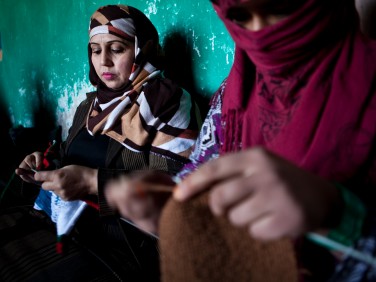 She isn’t exaggerating. After 35-plus years of near-continuous conflict, Afghanistan is the tenth poorest country in the world, with a child mortality rate of 99/1,000, the highest outside sub-Saharan Africa, and a maternal mortality rate of 460/100,000, the second-highest outside sub-Saharan Africa.
She isn’t exaggerating. After 35-plus years of near-continuous conflict, Afghanistan is the tenth poorest country in the world, with a child mortality rate of 99/1,000, the highest outside sub-Saharan Africa, and a maternal mortality rate of 460/100,000, the second-highest outside sub-Saharan Africa.
Like so many others at Hand in Hand Afghanistan – from fellow vocational trainers to CEO Abdul Rahim Nasry – Palwasha knows our members’ struggle first-hand. In the late-1990s, as conflict spread into north Afghanistan, the mother of six was forced to abandon a career in education and seek refuge in Pakistan. It was there, in a crowded immigration camp, that the graduate of Sayed Jamaluddin Afghan University learned how to sew, knit and rear poultry – skills she still teaches today.
“I’m proud to work with poor people toward a change”
Motivation
Hand in Hand hires local field staff exclusively. Beyond suiting our ethos of self-reliance – and helping keep expenditures low – the practice means trainers are invested in their work.
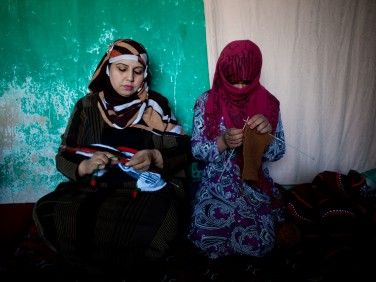
Palwasha returned to Balkh Province after the Taliban fell in 2001. Her husband found work as a doctor’s assistant. She found work with several NGOs, including a stint as poultry team supervisor at the UN’s Food and Agriculture Organization, before joining Hand in Hand more than a decade later in May 2013.
It’s work she has every intention of continuing. “The people I work with face many problems – poverty, a lack of education, inadequate life skills – but by the time they graduate I find them strong and enabled,” says Palwasha. “When they start to earn money they improve their position in the family and in society.”
Balkh Province, Afghanistan
Editor’s note: Palwasha no longer works for Hand in Hand.
Meet Habiba, weaving her way out of poverty
Hand in Hand business trainees learn all kinds of skills – customer care, market research, product diversification – but carpet weaver Habiba, who joined a Self-Help Group last year, credits two in particular with lifting her out of extreme poverty: saving and carpet design. Given her six-fold increase in monthly income, it’s easy to see why.
Finding the thread
Until recently, Habiba wove carpets on wages for local shops. In Afghanistan’s far north, near the Uzbek border, weaving is tradition – an industry built of necessity in a region with poor soil and even worse water management.
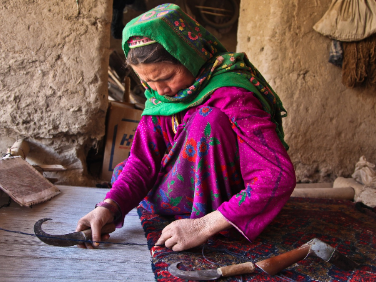 Trade with Central Asia has historically buoyed business, but recent unrest in the region means times have been hard – so hard, in fact, that Habiba’s children faced having to find work. Making matters worse, an influx of Uzbek insurgents paired with the region’s difficult roads meant help from NGOs was increasingly scarce. So when Hand in Hand arrived in her village offering business training, Habiba jumped at the opportunity.
Trade with Central Asia has historically buoyed business, but recent unrest in the region means times have been hard – so hard, in fact, that Habiba’s children faced having to find work. Making matters worse, an influx of Uzbek insurgents paired with the region’s difficult roads meant help from NGOs was increasingly scarce. So when Hand in Hand arrived in her village offering business training, Habiba jumped at the opportunity.
“I didn’t know about saving before, so I wasn’t able to start my own business,” says the 30-year-old mother of four. “I also didn’t have the skills to design new carpets. But I learned how to do both in my (Self-Help) Group.”
“The people I work with face many problems – poverty, a lack of education, inadequate life skills – but by the time they graduate I find them strong and enabled. When they start to earn money they improve their position in the family and in society”
-Hand in Hand trainer Palwasha Rafiqzada
A micro-entrepreneur’s guide to growth
That’s not all she learned. Recognising the threat posed by imported, chemically treated, machine-made carpets, Habiba devised a plan.
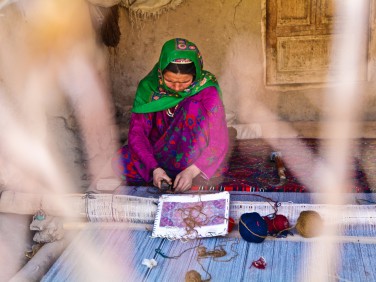
First, she researched which sizes and designs were most popular in local marketplaces. Next, she made sure to advertise her carpets’ competitive qualities: designs made to order, traditional craftsmanship and natural materials. Finally, she sought out new markets, engaging shop owners in Mazar-i-Sharif, the closest major city, and traders to export her carpets to neighbouring Uzbekistan. The result: an increase in monthly income from 2,500AFN (US $45) to 16,600AFN (US $300).
“There is no public school in our village but now I can afford to pay the fees for a nearby private school. I can also afford better food and clothes,” says Habiba.
Habiba’s results
![]()
Six-fold increase in monthly income
![]()
Expanded into foreign markets
![]()
Able to cover school fees for her children
